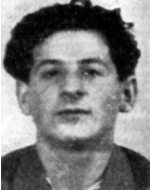Federmesser, Yaakov (Janek)
Yaakov, son of Batsheva and Zvi (Hirsch), was born in 1929 in Poland, in the city of Nowolice, near Lublin, and grew up in his hometown, the son of a large family with five brothers and a sister. The German invasion of Poland and the conquest of Poland in the Blitzkrieg War immediately followed by the publication of anti-Jewish decrees and regulations that led to the social isolation of the Jews, their economic deprivation, and the undermining of their entire lives. In the following months, the Jews of Poland were concentrated in ghettos, and a central ghetto was established in Lublin and the surrounding towns Until 1944. By the end of the war, 90 percent of the Jews of Poland, including almost all of the Jews of Lublin and the surrounding cities, had been sent to their extermination, and the town of Jacob and his parents was captured at the beginning of the war, At the end of the war, after the Russian Liberation Army entered Poland, Jacob was transferred to Russia for military training, but in his Lev he was attracted to my life. Fulfillment in the Land of Israel. He arrived at a Jewish refugee camp in Germany, where he showed up for training and training for the Hagana under the guise of a gym teacher in a school for refugee children. In July 1948, Ya’akov arrived in Israel on a ship from the Gahal (Overseas Recruitment) group, after which Yaakov visited his relatives in Tel Aviv and immediately joined the IDF. During the War of Independence, he was posted to a combat unit in the “Kiryati” Brigade – the 4th Brigade of the Hagana. As a trained horse handler, he was transferred, at his request, to the cavalry unit in the Givati Brigade – Division 5 – and since then has participated in numerous patrols and battles. At the beginning of October 1948, Yaakov went on holiday to celebrate Rosh Hashanah 5709. At the end of his leave, he said goodbye to his aunt: “Here I will know what I will give my soul for. When he returned to the battalion he participated in a battle on Hill 113 in Operation Yoav, which was one of the fortified outposts of the Egyptian army, which controlled an important crossroad in the northern Negev (now Givati Junction). The Negev was decided to conquer this place, and the task was assigned to the fighters of Givati On the night of October 17, 1948, the fighters stormed the outpost and conquered it in a fierce and cruel battle, a face-to-face battle that included the use of bayonets. During which he was hit by a bullet in his abdomen and was rushed to the Tel Hashomer hospital, where he died of his wounds two days later, on October 19, 1948. Yaakov was nine years old He was brought to rest in the Nahalat Yitzhak Military Cemetery, and on the combat page of the Givati Brigade, dated October 21, 1948, he was named after Ya’akov the half-brother of the Egyptian enemy, who later served the IDF. The survivors of the Holocaust are survivors of the Holocaust who survived the last remnant of their nuclear family (parents, brothers, sisters, sons and daughters) who experienced the Holocaust in the ghettos and / or concentration camps and / or in hiding and hiding in territories occupied by the Nazis and / Or in combat alongside members of the underground movements or partisans in the Nazi-occupied territories who immigrated to Israel during or after World War II, wore uniforms and fell in the Israeli army.
